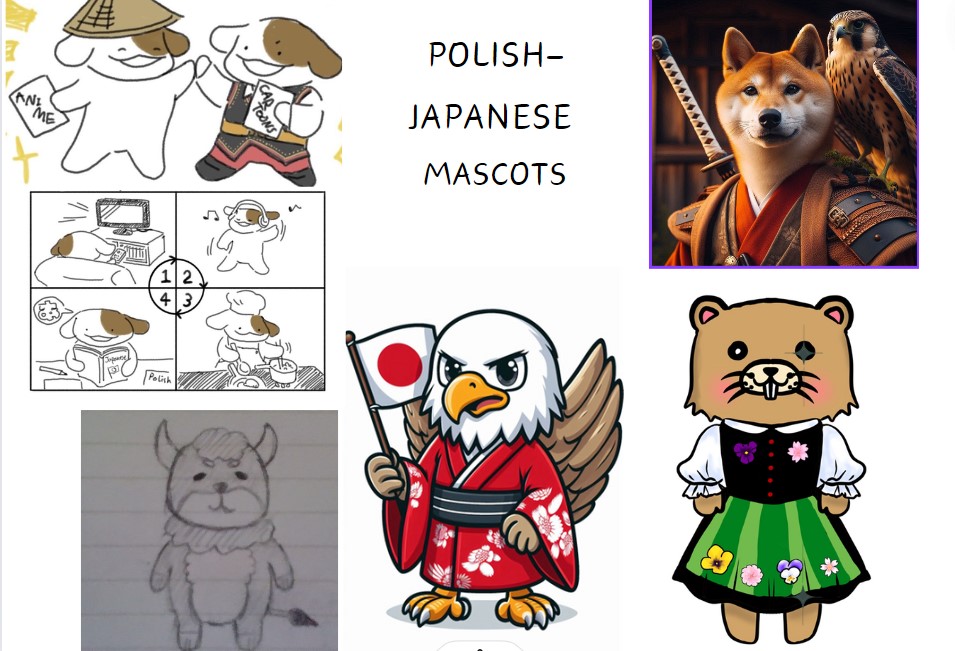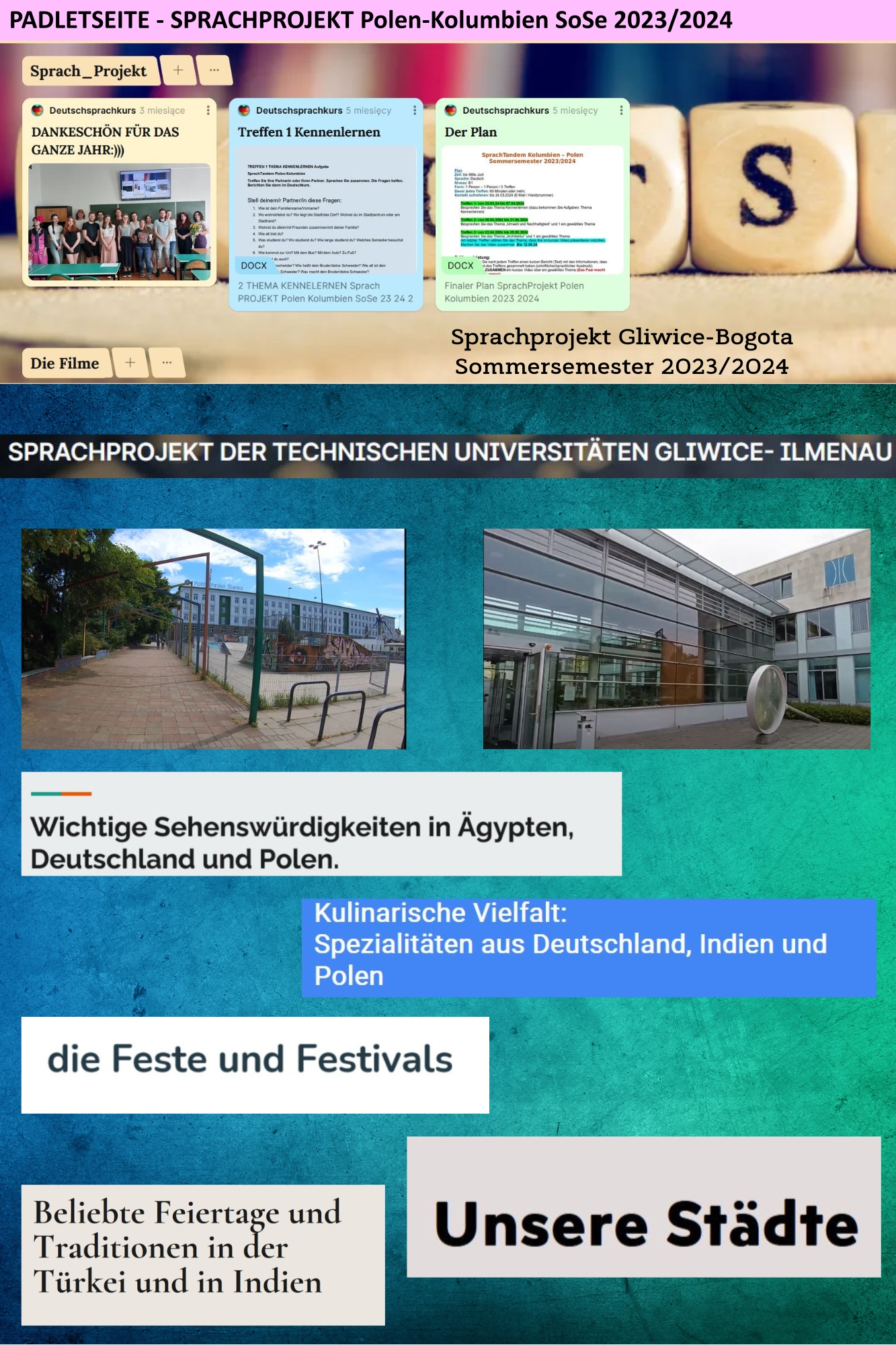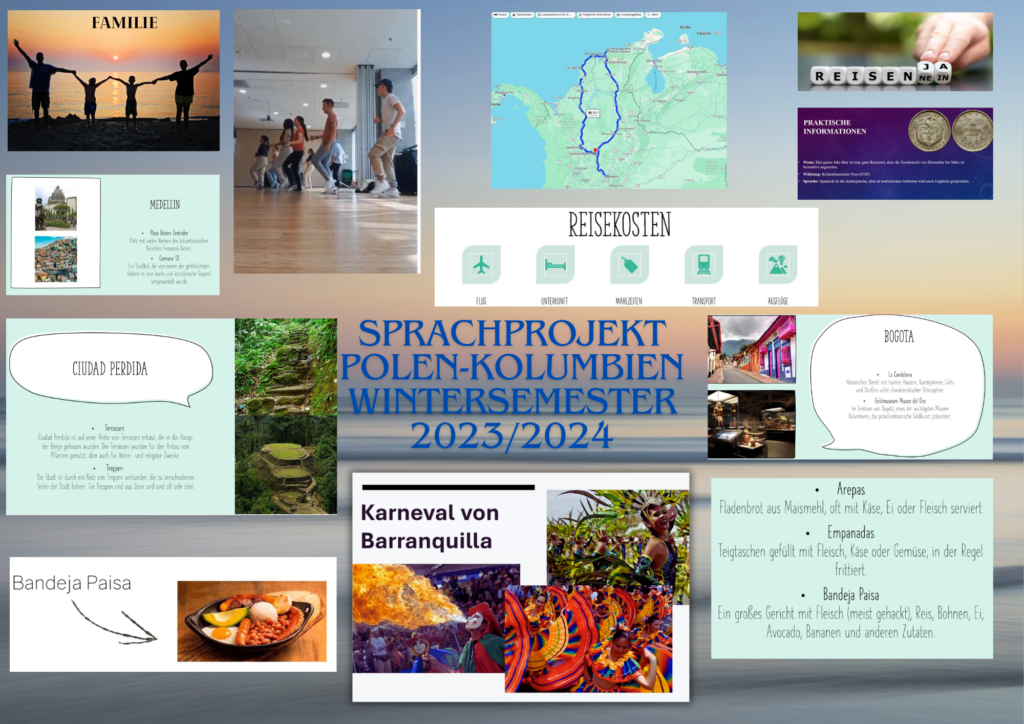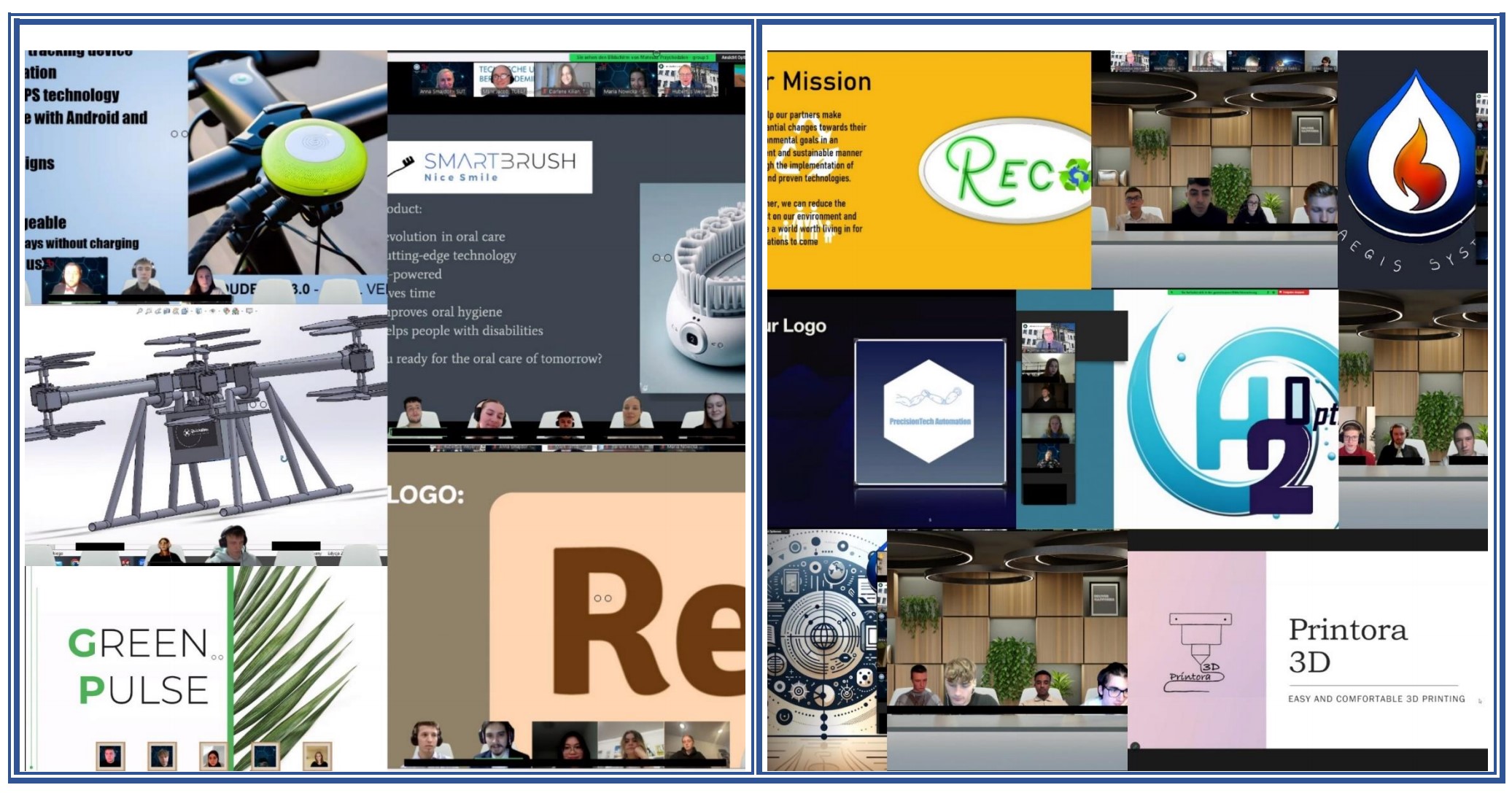Telecollaborations 2023/24
Poland - Japan project
On June 28, 2024, at 12.30 in Poland and 19.30 in Japan, a summary of the international telecollaborative project, carried out in the summer semester of 2023/2024 in cooperation with Otaru University of Commerce in Japan, took place on the Zoom platform.
The participants of the project, as part of the English language course, were Polish students from the 4th semester of the Faculty of Automatic Control, Electronics, and Computer Science, majoring in Computer Science, and Japanese students from mixed disciplines: Computer Science, Economics, and Law. The project coordinators were Prof. Daniela Caluianu and Iwona Seta-Dąbrowska, MA.
The aim of the project was to design mascots that combine elements of Japanese and Polish culture and represent the values of both universities. The project participants worked in international teams on the mascot's profile, first determining its name, characteristics, mission, types of activities, favourite tastes, music, etc., and then proceeded to design the mascots using various techniques, from hand-drawn sketches to artificial intelligence.
As a result of the project, several unique mascots were created, symbolizing cooperation and mutual understanding between students from Otaru University and our university. The project was very well received by students from both universities, who appreciated the opportunity to practically apply their language skills and enrich their experiences by learning about another culture and gaining new skills and knowledge about working in international teams.
Here are a few opinions from students summarizing the project:
“I’m a big fan of meeting new people and the fact of them being from the opposite side of the world makes it so much more exciting for me. People I got to know were amazing and I wish to meet them in a future. The only thing I would change is that I wish these type of projects were more common and the meetings longer.”
“To be honest, it's been a long time since I've been so engrossed in English lessons. Despite all the inconveniences, I think the project was not a waste of time, quite the opposite. Thanks to this project we have used English in a practical way, which allows us to build up our confidence in using a non-native language and by the way it was a fun experience. It was a nice initiative and may there be more such initiatives.”
“I’ve never had an experience like this before, but I received it positively. There were some problems, but overall I’m glad I had the opportunity to attend these kinds of classes. My favourite thing about the experience was meeting people with mindsets very different from my own. Also learning new things about Japan straight from Japanese students was a privilege.”

-----------------------------------------------------------------------------------------------------------------
Poland – Germany
International Student Telecollaboration Project between Wiesbaden Business School, Technische Universität Bergakademie Freiberg, University of Łódź, and Silesian University of Technology (April–June 2024)
The second edition of the International Student Telecollaboration Project took place during the summer semester of the 2023/2024 academic year. Around 100 students from four universities—Wiesbaden Business School (a unit of RheinMain University of Applied Sciences), Technische Universität Bergakademie Freiberg, the University of Łódź, and the Silesian University of Technology—participated in the initiative. The project brought together students from various technical and business disciplines, working collaboratively in 12 mixed teams.
Similar to the first edition, the project involved:
Establishing a company and designing a product
Creating a business plan and preparing a business presentation
Establishing partnerships with new collaborators
Gaining direct experience in intercultural communication
Developing teamwork skills, including role-playing and conflict resolution
Working in an English-speaking environment and presenting projects in an immersive remote setting
Enhancing IT skills through remote collaboration and digital content creation
In the evaluation survey, students highlighted that the project helped them better understand the impact of teamwork on efficiency, particularly regarding workload distribution and time management. They also gained insights into project organization and leadership within a group setting. Among the most valuable skills acquired, participants frequently mentioned interpersonal and intercultural competencies.
The project was made possible through digital tools such as Zoom, Padlet, and online communication platforms, which facilitated both synchronous and asynchronous interactions. Additionally, participants’ high level of digital literacy contributed to the project’s success.
Project Coordinators:
Mark Jacob (Technische Universität Bergakademie Freiberg)
Darlene Kilian (Technische Universität Bergakademie Freiberg)
Maria Nowicka (Silesian University of Technology)
Hubertus Weyer (Wiesbaden Business School)
Dominik Skowroński (University of Łódź)
Anna Smajdor (Silesian University of Technology)

-----------------------------------------------------------------------------------------------------------------
Poland – Colombia
Learning Together and Engaging in Dialogue: A Language Project between Students of Silesian University of Technology and EAN University in Bogotá
The language project, conducted during the summer semester of the 2023/2024 academic year, brought together students from the Faculty of Architecture at the Silesian University of Technology and students from the Faculty of Modern Languages at EAN University in Bogotá. Its primary aim was to enhance and practically apply language skills while developing communication competencies in German. Another key objective was to promote intercultural exchange and foster international relationships among participants.
The project encouraged autonomous learning, creativity, and preparation for real-life communication scenarios by breaking down language barriers and strengthening students’ motivation to learn foreign languages. Discussions in pairs, conducted via videoconferencing platforms, covered a wide range of topics related to Poland and Colombia, including self-introductions, places of residence, daily routines, climate, weather, food and drink, holidays, traditions, travel, studies, leisure time, new technologies, media, music, literature, film, and personal experiences with learning foreign languages. A particularly significant aspect of the project was the exchange of perspectives on architecture, the environment, and sustainable development.
The project culminated in the collaborative creation of a short film on selected topics, fostering teamwork and creativity among students.
Project Coordinators:
Renata Pelka, MA, Senior Lecturer in German, Foreign Languages Centre, Silesian University of Technology
Dr. Angélica Mariana Mateus Laverde, Lecturer in German, Faculty of Humanities and Social Sciences, EAN University, Bogotá, Colombia

-----------------------------------------------------------------------------------------------------------------
Poland – Germany
Developing Language Skills and International Collaboration: A Language Project between Students of Silesian University of Technology and Technical University of Ilmenau
The language project between students of the Silesian University of Technology and the Technical University of Ilmenau aimed to enhance practical German language proficiency and develop communication skills. The project fostered autonomy, creativity, and international cooperation, preparing students for real-life communication scenarios while strengthening their motivation to learn foreign languages.
The project plan included online meetings where participants conducted introductory interviews, jointly selected a group name, and justified their choice in a short text. After the first meeting, students prepared a report on their discussion and reviewed it during class. Subsequent meetings involved discussions on selected topics (e.g., student life, tourism, hobbies, holidays and traditions, cuisine, music, travel, sports, literature, and film) as well as planning the final project—a video or presentation. The completed projects were published on the Padlet platform.
Project Coordinators:
Renata Pelka, MA, Senior Lecturer in German, Foreign Languages Centre, Silesian University of Technology
Anke Geschwend, Lecturer in German, Zentralinstitut für Bildung, Technical University of Ilmenau
-----------------------------------------------------------------------------------------------------------------
Poland – Colombia
Breaking Cultural and Language Barriers: Polish and Colombian Students Practicing German Together
During the winter semester of 2023/2024, another successful edition of the language project between students of the Silesian University of Technology and EAN University in Bogotá, Colombia, took place. This telecollaboration project engaged 82 participants, leveraging modern communication technologies to facilitate collaboration between individuals across different countries and continents.
Participants scheduled meetings at mutually convenient times, taking into account the six-hour time difference between Poland and Colombia. These one-on-one meetings primarily aimed at developing German language skills, with English serving as an additional tool for communication. The main objective was to enable students to practice German through language-based tasks related to everyday life, culture, and traditions in both countries. As part of their coursework, students were required to introduce their partners in German and write a report on their meetings. The project culminated in the creation of a short film presenting their partners and Colombia.
This was the third edition of the Poland–Colombia language project. While different students participated in the first two editions, an unexpected but meaningful highlight of the winter 2023/2024 edition was that the same group of students from the previous year took part again, demonstrating the project's positive impact and appeal.
One of the key assignments was to plan a trip to Colombia, create a travel brochure, and deliver a German-language presentation or a report titled "My Trip to Colombia: What to See? How to Get There?"
Project Coordinators:
Renata Pelka, MA, Senior Lecturer in German, Foreign Languages Centre, Silesian University of Technology
Dr. Angélica Mariana Mateus Laverde, Lecturer in German, Faculty of Humanities and Social Sciences, EAN University, Bogotá, Colombia
Students' Feedback on the Project:
"I really enjoyed the project. It was very well organized, and our instructor helped facilitate contact. It improved my language skills, and I also learned a lot of interesting facts about Colombia."
"The project was interesting. It was a great opportunity to meet new people and explore another culture. There was no pressure from the instructor, which was an added bonus."
"I especially liked the meetings about traveling to Colombia because they provided a deeper understanding of the country, with firsthand insights from someone who had been there."

-----------------------------------------------------------------------------------------------------------------
Poland - Germany
International Student Collaborative Project between Wiesbaden Business School, Freiberg University of Mining and Technology, and Silesian University of Technology - October 2023-January 2024
During the winter semester of the academic year 2023/2024, an International Student Collaborative Project (Collaborative Online International Learning Project - COIL) was conducted by Wiesbaden Business School (a unit of RheinMain University of Applied Sciences), Freiberg University of Mining and Technology, and the Silesian University of Technology. The initiative involved 100 students from three universities who were divided into 10 groups. Each group consisted of students from various fields such as management, intercultural communication, automation and robotics, as well as aerospace engineering. Students collaborated on assigned tasks.
The project aimed to:
- establish a company and design a product;
- write a business plan and subsequently deliver a business presentation;
- establish partnerships with new collaborators;
- gain direct experience in intercultural communication;
- develop skills in assuming different roles in teamwork and conflict resolution;
- gain experience working in an English-speaking environment and presenting projects in a remote immersive environment;
- improve IT skills during remote collaboration and content creation.
In-depth discussions at the end of the project yielded diverse insights. The students encountered communicative and intercultural differences. It was acknowledged during discussions that overcoming inherent challenges and frustrations was an educational factor. The distinctiveness and diversity enriched the experience of both the students and the teachers. From this perspective, all the students benefited on multiple levels throughout the project.
The project organizers, Anna Smajdor, Maria Nowicka, Hubertus Weyer, Mark Jacob, and Darlene Kilian, met during a course in March 2023. Numerous subsequent remote meetings led to the first implementation of the collaborative project, which commenced in October 2023 and concluded in January 2024. Zoom, Padlet, and online messengers were used as platforms for synchronous and asynchronous collaboration by all participants. From the outset, the teachers were aware that the collaboration offered opportunities and conditions that could not be arranged independently in class. Combining forces in one project yielded incomparably greater results.










